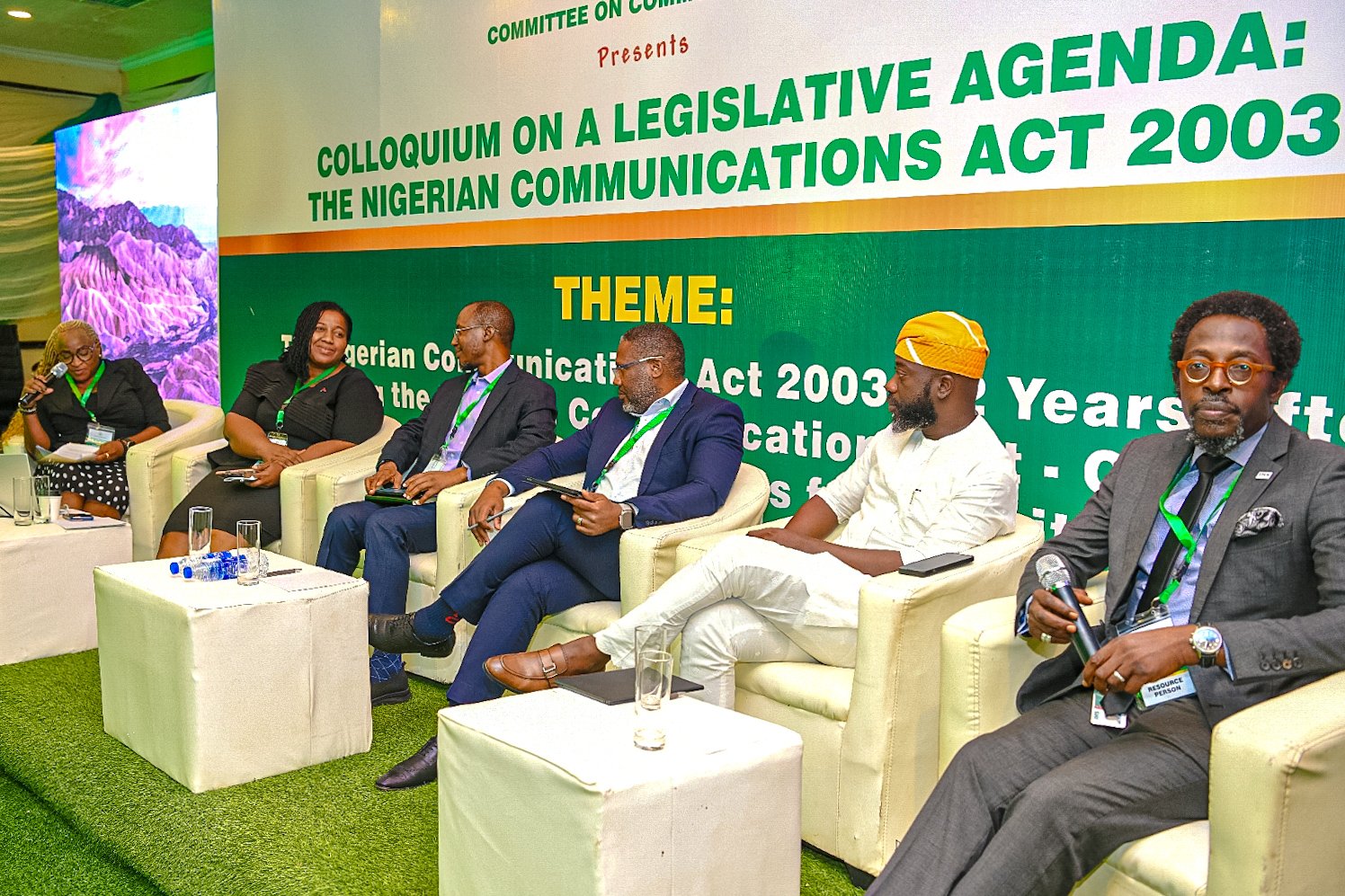Panel session during the Telecoms Colloquium hosted by the House Committee on Communications
Late dramatist and playwright, Prof Ola Rotimi, once wrote a play, Holding Talks. In this work, which falls under the genre of theatre of the absurd, two characters are having a conversation forever or will ad nauseam be a better word? In this conversation, there is neither head nor tail and the repetition can be boring or annoying except you spice the cast with exciting or energetic actors. Lovely stuff of academic distinction.
In this country, we love holding talks. So many of them. And the outcomes are pretty predictable, and the place of the papers and reports guaranteed – kept where they may never be revisited!
We had one last week, and please bear me witness that I do not have the capacity to ever suggest that the Telecoms Colloquium which held in Lagos under the auspices of the House Committee on Communications at the National Assembly, will end in the manner of Holding Talks, a play which Rotimi used to satirise our propensity to talk as a people with very little results.
There were two significant developments in the sector as the colloquium was holding. One, a residual trade dispute between MTN and Kogi State which led to service disruption in parts of the state, and the other, MTN returning to the path of profit after consecutive trade losses. Also be mindful that I am not saying here that MTN is like the tortoise that appears in every story; I am just trying to zero on the point that while the issue with Kogi may not enjoy any attention, the latter which has to do with the organisation making profit is the kind of stuff the lawmakers would love. But MTN featured in the two stories in such a variegated form I thought should engage the interest of our lawmakers.
Advertisement
For the telecommunications industry, there is always something very positive to acknowledge, much unlike the power and energy sectors, among others, where there exists a dismal dearth that increases widespread concerns among the people. In spite of seeming inadequacies in the telecoms sector, the stakeholders who gathered in Lagos – lawmakers, operators, lawyers, finance industry operators, equipment manufacturers and vendors, and subscribers, all agreed to the great strides recorded in the industry since early 2003.
“The Nigerian Communications Act 2003 has been instrumental in shaping our telecommunications landscape. However, 22 yers later, it has become essential to reassess its provisions, identify challlenges, and explore opportunities for growth and development in our rapidly changing world,” Chairman of the House Committee, Peter Akpatason, pointed out most succintly.
His position can hardly be faulted. Even the EVC of the Nigerian Communications Commmmission (NCC), Dr Aminu Maida, agreed completely as he said the Act has heralded a new era for the telecommunications sector in just over two decades.
Advertisement
It is true that the industry is worth over $75bn today with over 153m lines in the hands of subscribers across the nation. It has become an enabler of other sectors giving rise to a wave of unanticipated developments. It is also true that the industry has been straining at the seams causing a lot of service issues that make subscribers unhappy. Modernity is playing a role in the sector that can hardly be overlooked.
In 2003, at the birth of the Act, Nigerians craved for basic telecoms services, nothing more. At the time, there were no Internet of Things (IoT), Over-the-Top (OTT) services – WhatsApp, Instagram, Netflix, Uber, just to name a few, Cybersecurity, Artificial Intelligence (AI) – nobody was thinking that you could go to a restaurant and a humanoid will have to serve you tea, no Space Tourism – some guys waving to humans from the edge of space, and no Autonomous Self-Driving Cars. It hardly occurred to anybody then that life would throw its entire weight on telecommunications and force the sector to buckle somewhat, tethering for survival. It has been a good ride for the industry but time has come to grow the Act to enable it cope with all these nuanced developments and pave the way for a fresh foundation for sectorial infrastructural growth.
So, without doubt, I totally agree with former regulator and now legal practitioner, Yetunde Akinloye, when she observed in her paper, The Nigerian Communication Act 2003 – Impact Analysis on the Communications Sector, that the Act is “not in tune with Current realities – Fines, Digital Economy Policy, National Broadband Plans, Technology Evolutions, AI, OTT, IOT and Data Driven Services.”
But the Act was bold on a number of things, for instance, the independence of the regulator but silent on the things it never anticipated. The Act did not make provisions for this wave of cyber criminality, of people living their life in cyberspace, fleecing others of their fortunes or even stalking them to death. The Act did not anticipate that a state in the federation would wake up one morning and vandalise telecommunications facilities in pursuit of taxes in dispute. The Act did not envisage a number of things because the visioning didn’t happen at the time.
Advertisement
A piece of good news from the colloquium is the agreement by stakeholders of the industry, including the regulator, NCC, to work with the National Assembly to review the Act and equip it to cope with unfolding industry issues. They see it as a task that must be done. When was the last time you heard that expression?
The lawmakers must take cognisance of a number of bills going through legislative processes that all seem to derive from, or detract from the efficacy and substance of the 2003 Act. I am happy that she particularly referenced the regulatory overlaps between NCC, FCCPC and NITDA. Many more are in the making. The reviewers should watch out for regulatory overlaps that portends evil for the industry.
The hallmark of the 2003 Act is the independence of the regulator. But that independence was trampled to the mud under the previous administration which pushed the regulator and industry close to a precipice from which they are still trying to find stability.
It is good that a review process has started but Akinloye warns that “Laws must grow with the people and be responsive to any given peculiar circumstances. Nigerians will be counting on the legislature to review and produce a better version of the NCA, just as it did in 2003”.
Advertisement
The NCA 2003 gave Nigeria an industry. Will Akpatason and his team move the nation beyond Holding Talks and add value to the sector with a new Act?
Advertisement
Views expressed by contributors are strictly personal and not of TheCable.











